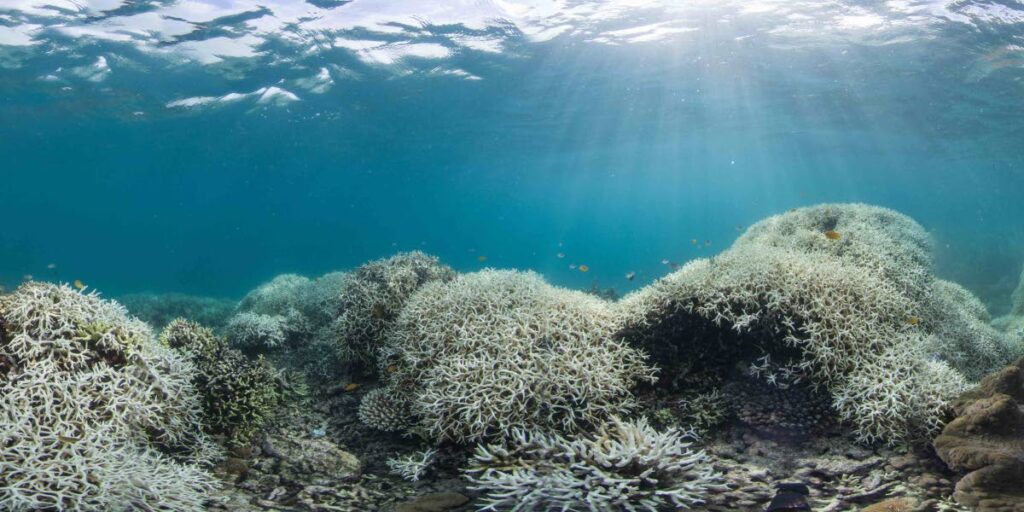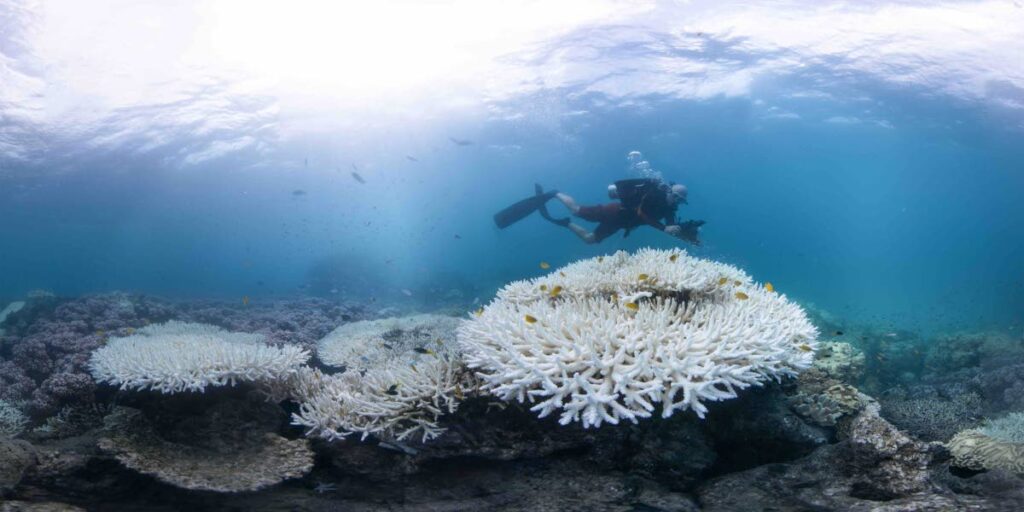Mass bleaching on the Great Barrier Reef

Dr Anjani Ganase talks about die-off of the most vulnerable creatures on the planet to global warming – corals. Bleaching is happening today; and this planetary indicator does not bode well for humanity.
Over the past week, marine scientists from the Great Barrier Reef Marine Park Authority have observed coral bleaching on the Great Barrier Reef (GBR). Certain areas are being described as severe, particularly along the central GBR near Townsville, a community largely dependent on the reef ecosystem for jobs and livelihoods. This year (possibly for the first time) the reefs are experiencing above average warming conditions, despite being in a La Niña phase. La Niña is associated with higher rainfall and cloud cover, conditions associated with cooling oceanic conditions. Nevertheless, many parts of the central and southern sections of the GBR are experiencing 0.5 - two degrees Celsius above the average temperature, while the northern sections of the GBR are experiencing between two to four degrees Celsius above average temperatures.
The extent of the bleaching is still unknown, as it takes scientists several days to survey sections of the reef by plane. The Great Barrier Reef is huge! It is 2,300 km of coral reefs covering an area of 344,000 km2. This is equivalent to the area of the UK, Switzerland and The Netherlands combined. There are 3,000 distinct coral reefs, 600 continental islands, 300 coral cays that house over 600 species of corals, 1,625 species of fish, 133 varieties of rays and sharks and 30 species of marine mammals – dolphins and whales.
The history of coral bleaching in the GBR
There have been five mass bleaching events on the Great Barrier Reef since 1997, with three of these events occurring in the last five years (2016, 2017 and 2020). While the mass bleaching of 1997 resulted from El Niño conditions, the events over the last five years were aggravated by climate change. There is an overall trend of more intense warming conditions resulting in more severe bleaching and coral mortality occurring more extensively across the GBR. In the future, sections of Great Barrier Reef are likely to experience severe bleaching events every year before 2030. Given the expanse and heterogeneity of the GBR, there are areas of hope where scientists have identified potential sites of refuge (cooler spots) that may assist in coral recovery of the surrounding coral reefs impacted by coral bleaching. However, all of this depends on the trajectory of global warming.
Coral reefs, especially the GBR that is relatively well managed for other stressors – fisheries, pollution, and outbreaks of coral eating crown of thorns starfish – can recover from bleaching. However, if bleaching events become too frequent (every two to three years), reefs will not be able to recover sufficiently, and the corals die off. On top of the threats of global warming, reefs are also at risk of natural disturbance events, such as cyclones that contribute to coral mortality. Extensive coral death means fewer corals to reproduce coral larvae, which is the main form of recovery (re-seeding of coral in the same area or from neighbouring reefs). Coral mortality also reduces coral connectivity, which is essential for successful mixing of genetic material during reproductive spawning events to maximise genetic diversity. Studies show that severe bleaching and mortality result in 80 - 100 per cent loss in larval supply for the affected area. Even coral growth, reproduction and resistance to diseases all become impaired at elevated temperatures.
Australia needs to move away from fossil fuels
“Ongoing aerial surveys of coral bleaching by the Great Barrier Reef Marine Park Authority (@gbrmarinepark) reveal (so far) a footprint of mass bleaching similar to 2017, when the central 500 km region was hardest hit. How many more maps will it take to trigger real reductions in greenhouse gas emissions?” Professor Terry Hughes, director of the Australian Research Council, Centre of Excellence for Coral Reef Studies tweeted on March 18.

The announcement of the bleaching by the Great Barrier Reef Marine Park Authority has occurred days before a visit by Unesco to assess the health of the World Heritage Area (declared in 1981). Coral reef scientists have highlighted through many studies that the bleaching events are a direct result of climate change and will become worse.
When I studied in Australia, we surveyed kilometres upon kilometres of coral reefs in the northern section of the Great Barrier Reef that have died because of the 2016 coral bleaching. Areas that were considered to be environmentally pristine otherwise were most severely affected by climate change. The latest IPCC report states that the projected climate impacts over the next 30 years are pretty much set in stone regardless of how much we reduce our carbon emissions from now on. The carbon reductions from here on will only start to impact our mid (2050) to long-term (2100) future. This paints a bleak outlook for coral reefs around the world and the Great Barrier Reef, as most corals will be lost with even a 1.5 C rise.
Coral reef scientists have insisted that Australia rapidly and urgently divest away from fossil fuels, considering how much they have to lose as a country as home to the largest barrier reef system in the world, a natural resource that deserves to be a priority for protection. These are not the only impacts to Australia as they have experienced some of the worst wildfires and droughts in recent years, along with the die-off of kelp and mangrove forests.
Curb carbon emissions
The only management that can prevent mass coral bleaching and die-off is the rapid curbing of carbon emissions, and this must be done urgently and globally. Climate change can be halted and reversed by global co-ordination and urgent national consensus and activities. It is hoped that Australia, a country that is an island and a continent, might lead the charge considering what is at stake and considering the severe consequences to its citizens.

Comments
"Mass bleaching on the Great Barrier Reef"